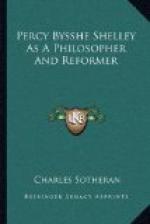“Poets are the hierophants of an unapprehended inspiration; the mirrors of the gigantic shadows which futurity casts upon the present; the words which express what they understand not; the trumpets which sing to battle and feel not what they inspire; the influence which is moved not, but moves. Poets are the unacknowledged legislators of the world.”
I have no hesitation in saying that for treating Shelley as a philosopher, I shall be attacked with great “positivism” by the disciples[A] of manufacturers of bran-new Brummagen philosophies dug out of Aristotelian and other depths to which are added new thoughts, not their own. The reason which David Masson offers in his “Recent British Philosophy” for placing Alfred Tennyson among the same class is equally applicable now:
[Footnote A: If Diogenes or Socrates, leaving High Olympus and sweet converse with the immortals, were to condescend to visit New York some Friday evening. I am sadly afraid they would be astounded at many of their would-be brothers in philosophy. On seeing the travestie of ancient academies and groves where the schools used to congregate, the dialogues consisting of bald atheism under sheep’s clothing to trap the unwary, and termed “The Religion of Humanity,” of abuse and personality in lieu of argument, of buffoonery called wit, of airing pet hobbies alien to the subject instead of disputating, of shouting vulgar claptrap instead of rhetoric, etc.—I sadly fear these stout old Greeks, having power for the nonce, would, throwing philosophy to the dogs in a moment of paroxysmal indignation, despite physiognomies trained to resemble their own, have these fellows casked up in tubs without lanterns, but with the appropriate “snuffers,” fit emblems of their faiths, and dropped far outside Sandy Hook. A proper finale to the vapid utterance made by one of these gentry that all “Reformers should be annihilated,” Imagine Plato or Epicurus offering such a suggestion. O tempora! O mores!]
“To those who are too strongly possessed with our common habit of classifying writers into kinds, as historians, poets, scientific and speculative writers, and so on, it may seem strange to include Mr. Tennyson in this list. But as I have advisedly referred to Wordsworth as one of the representatives and powers of British philosophy in the age immediately past, so I advisedly named Tennyson as succeeding him in the same character. Though it is not power of speculative reason alone that constitutes a poet, is it not felt that the worth of a poet essentially is measured by the depth and amount of his speculative reason? Even popularly, do we not speak of every great poet as the exponent of the spirit of his age? What else can this mean than that the philosophy of his age, its spirit and heart in relation to all the great elemental problems, find expression in his verse? Hence I ought to include other poets in this list, and more particularly Mr. Browning and Mrs. Browning,




